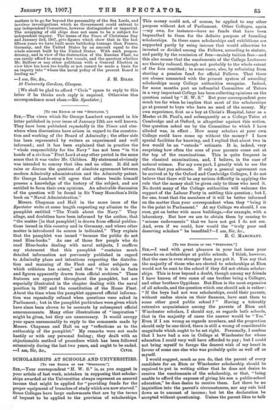SCHOLARSHIPS AT SCHOOLS AND UNIVERSITIES.
[TO THY EDITOR OF THIN "SPEC...TOR-1 STE,—Your correspondent "H, W. S." is, as you suggest in your article of last week, mistaken in supposing that scholar- ships awarded at the Universities always represent an assured income that might be applied for "providing funds for the proper equipment of branches of study which are now starved." Some Colleges have large endowments that are by the terms of bequest to be applied to the provision of scholarships. This money could not, of course, be applied to any other purpose without Act of Parliament. Other Colleges, again —my own, for instance—have no funds that have been bequeathed to them for the definite purpose of founding scholarships. In these cases scholarships and exhibitions are supported partly by using income that would otherwise be invested or divided among the Fellows, according to statute, and partly by the remission of fees—mainly tuition fees—and this also means that the emoluments of the College Lecturers are thereby reduced, though not probably to the whole extent of the fees remitted; in some cases, also, by refraining from starting a pension fund for official Fellows. That there are abuses connected with the present system of awarding scholarships many College authorities recognise. Indeed, for some months past an influential Committee of Tutors in a very important College has been collecting opinions on the question raised by "H. W. S." But your correspondent goes much too far when he implies that most of the scholarships go at present to boys who have no need of the money. My own experience, first as a boy at Christ's Hospital, later as a Master at St. Paul's, and subsequently as a College Tutor at Cambridge and at Oxford, is altogether against this notion. One question asked me by the Committee to which I have alluded was, in effect . How many scholars at your own College could have come up without the money ? I have special facilities for knowing, and I replied that about two in five would be an " outside " estimate. It is, indeed, very surprising how often the sons of poor parents come out at the top of the examinations. This is quite frequent in the classical examinations, and, I believe, in the case of natural science. For my own part, I greatly wish to see the reform that you advocate. If only a general agreement can be arrived at by the Oxford and Cambridge Colleges, I do not believe that there will be any serious difficulty in applying the rule that the money shall be given only to those who need it. No doubt many of the College authorities will welcome the support of the Labour Party in settling this question ; but I, for• one, trust that the members of it will be better informed on the matter than your correspondent when they " bring it to the point in Parliament." At my College we should, I am sure, get on better with more buildings,—for example, with a laboratory. But how we are to obtain them by ceasing to "misuse endowments" that we have not got I do not see. And, even if we could, how would the "truly poor and deserving scholars" be benefited ?—I am, Sir, Ste.,
E. C. MARCHANT.






































 Previous page
Previous page